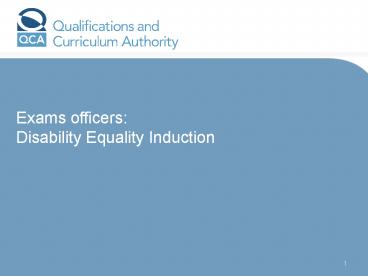Exams officers: Disability Equality Induction - PowerPoint PPT Presentation
1 / 12
Title:
Exams officers: Disability Equality Induction
Description:
Three-fifths of each group wanted to stay on in education; between one-quarter ... Three-fifths of non-disabled young people reported that they got the education ... – PowerPoint PPT presentation
Number of Views:33
Avg rating:3.0/5.0
Title: Exams officers: Disability Equality Induction
1
Exams officers Disability Equality Induction
2
Disabled learners
- Research into the education and employment of
disabled young people by the Joseph Rowntree
Foundation has found that - The scope and level of aspirations among disabled
16-year-olds were similar to those of their
non-disabled counterparts. Three-fifths of each
group wanted to stay on in education between
one-quarter and one-third were aiming for a
professional qualification. - Disabled and non-disabled 16-year-olds expected
the same level of earnings from a full-time job. - Despite these similar aspirations, the experience
of disabled and non-disabled young people
diverged sharply in early adulthood. Three-fifths
of non-disabled young people reported that they
got the education or training place or job they
wanted after finishing compulsory education,
whereas just over half of disabled youngsters
said the same.
3
Disabled people
- Some facts about disabled people in the UK
- Nearly one in five people of working age (6.9
million, or 19 per cent) in Great Britain are
disabled - Only 17 per cent of disabled people were born
with their impairment - There are currently 1.2 million disabled people
in the UK who are available for and want to work - Only half of disabled people of working age are
in work (50 per cent), compared with 80 per cent
of non disabled people - The average gross hourly pay for disabled
employees is 10.68 compared to 11.74 for non
disabled employees. - Source The Shaw Trusts Website as of 1 June
2009
4
Disabled people and qualifications
- 24 per cent of disabled people have no
qualifications compared to 9 per cent of
non-disabled people - (Source the Shaw Trust website as of 1 June 2009)
5
The Disability Discrimination Act
- The Disability Discrimination Act was passed in
1995 and amended in 2005. The legislation - makes it illegal to treat disabled people less
favourably than non-disabled people - requires employers and service providers to
provide reasonable adjustments for disabled
people. - It also specifically requires educational bodies
to - ensure that disabled candidates do not receive
less favourable treatment on the basis of their
impairment in any situation, including the
setting and marking of exams and assessments - ensure that reasonable adjustments are made to
improve any substantial disadvantage experienced
by a disabled candidate.
6
How does the law define a disability?
- The law defines a disability as
- a physical or mental impairment that has a
substantial and long-term adverse effect on a
her/his ability to carry out normal day-to-day
activities - This can include
- hearing impairment/ deafness
- intermittent depression and other mental health
issues - cancer
- dyslexia
- being HIV positive
- learning difficulties
- visual impairment/ blindness
7
What are reasonable adjustments in an exam?
- There is no one size fits all approach to
reasonable adjustments in an - exam each learner is a different individual and
will need - different adjustments.
- It is important to remember that these are not
concessions for the - individual candidates, but adjustments designed
to reduce/remove - unfair disadvantage.
- They might include, but are not limited to
- modified test papers, for example enlarged print
or Braille - up to 25 per cent extra time
- a reader or scribe
- supervised rest breaks
- a prompter
- use of a computer or other technology
- use of an individual room
- different coloured scripts
8
Not just disability
- Access arrangements cover more than disability
- For example, a bilingual dictionary
9
Possible issues encountered
- Are the rooms for exams accessible for all of the
candidates? Are chairs available when queuing? - Is there an accessible toilet near the exam room?
- Have emergency evacuation procedures been adapted
to take account of the needs of any disabled
candidates? - Are invigilators aware of health and safety risks
and, if necessary, has a risk assessment been
undertaken for the environment? - Are staff aware of policies on medication,
especially during stressful occasions like exams? - Are complaints procedures accessible for all
candidates? - Are back-ups in place if support equipment fails
to work properly?
10
Recruitment of invigilators
- Do policies make it clear that invigilator
applications from disabled people are welcomed
and that reasonable adjustments will be made to
support their needs? - Are there appropriate disclosure policies for
invigilators? - Have all invigilators received disability
equality training? - How do invigilators find out about the relevant
access arrangements in place for each exam?
11
Consequences of adjustments not being made
- If a requested access arrangement is not made by
the centre, or a candidate is not given the
chance to apply for an adjustment that they are
entitled to - the centre may be in breach of the law and
subject to legal challenge, which has financial
and reputational implications - the centre may have its approval revoked.
12
Further information
- For more information on access arrangements,
please visit the TESG website atwww.qca.org.uk/t
estsandexams - The Joint Council for Qualifications (JCQ)
booklet Access arrangements and special
consideration regulations and guidance relating
to candidates who are eligible for adjustments in
examinations is published annually in September.
It can be downloaded from the JCQ website at
www.jcq.org.uk and is also available on CD-ROM.































